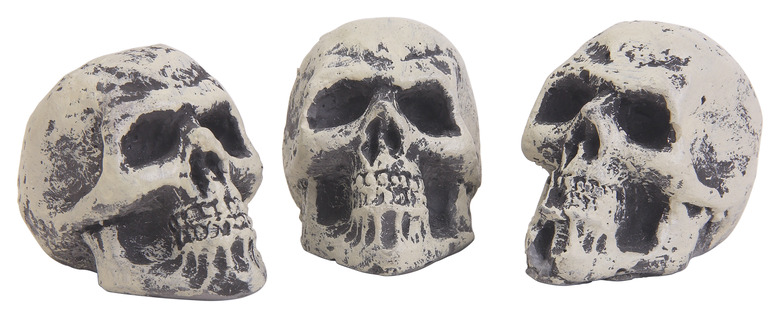The Difference Between Craniology & Phrenology
Craniology and phrenology are both practices that examine the conformation of the human skull; however, the two are very different. Craniology is the study of differences in shape, size and proportions among skulls from various human races. Phrenology deals with similar attributes of the skull, but attempts to relate these things to character and mental facilities. Though once believed to be a legitimate discipline, phrenology is now considered a pseudoscience.
Craniology
Craniology
By studying the morphology of the human body, including the skull, anthropologists can make hypotheses about attributes that can be linked to race and sex. Ethnic groups from different parts of the world have different skull shapes; similar attributes between groups may offer clues as to migratory patterns of ancient populations. Craniology is also of more immediate interest: it is essential in forensic investigations to determine the sex and race of dead people when only skeletons remain. This can help solve a crime or determine the fate of a missing person.
Phrenology
Phrenology
The belief that the shape of the skull can reveal character traits likely goes back to ancient Greece. However, modern phrenology began in the 18th century with an Austrian physician, Franz Joseph Gall. Gall believed that if someone had an enhanced faculty, such as the ability to memorize, that the corresponding area of the brain would be enlarged and the enlargement would be reflected by a bump on the skull. By studying the bumps on the skull one should therefore be able to determine a person's character.
Problems of Craniology
Problems of Craniology
The study of craniology has been important in anthropology and it is really just the study of comparative anatomy, but it has been a component in some social problems having to do with race. Early practitioners falsely believed that skull size or shape related to intellectual capacity, and thus that craniology could be used to declare some races inherently superior and others "primitive" or prone to criminal behavior.
Problems with Phrenology
Problems with Phrenology
Phrenology was a popular study even in the early 20th century, when the workings of the brain were still mysterious even to scientists. Today we know that temperament cannot influence the shape of the skull. Furthermore, Gall and his fellow phrenologists spoke of characteristics that were not well defined or easy to measure, such as "sisterly love" and "family values." Phrenology, like astrology, is still of interest to some, but has been invalidated as a science.
Cite This Article
MLA
Schab, Terri. "The Difference Between Craniology & Phrenology" sciencing.com, https://www.sciencing.com/the-difference-between-craniology-phrenology-12759816/. 9 January 2014.
APA
Schab, Terri. (2014, January 9). The Difference Between Craniology & Phrenology. sciencing.com. Retrieved from https://www.sciencing.com/the-difference-between-craniology-phrenology-12759816/
Chicago
Schab, Terri. The Difference Between Craniology & Phrenology last modified August 30, 2022. https://www.sciencing.com/the-difference-between-craniology-phrenology-12759816/
